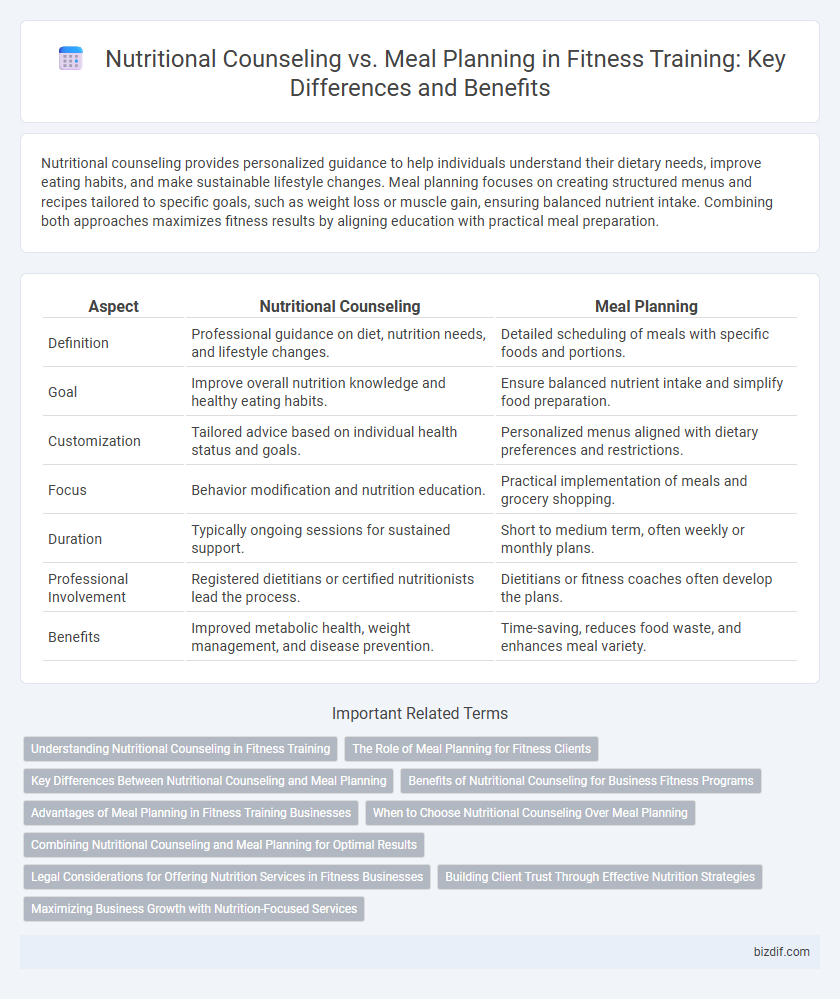Nutritional counseling provides personalized guidance to help individuals understand their dietary needs, improve eating habits, and make sustainable lifestyle changes. Meal planning focuses on creating structured menus and recipes tailored to specific goals, such as weight loss or muscle gain, ensuring balanced nutrient intake. Combining both approaches maximizes fitness results by aligning education with practical meal preparation.
Table of Comparison
| Aspect | Nutritional Counseling | Meal Planning |
|---|---|---|
| Definition | Professional guidance on diet, nutrition needs, and lifestyle changes. | Detailed scheduling of meals with specific foods and portions. |
| Goal | Improve overall nutrition knowledge and healthy eating habits. | Ensure balanced nutrient intake and simplify food preparation. |
| Customization | Tailored advice based on individual health status and goals. | Personalized menus aligned with dietary preferences and restrictions. |
| Focus | Behavior modification and nutrition education. | Practical implementation of meals and grocery shopping. |
| Duration | Typically ongoing sessions for sustained support. | Short to medium term, often weekly or monthly plans. |
| Professional Involvement | Registered dietitians or certified nutritionists lead the process. | Dietitians or fitness coaches often develop the plans. |
| Benefits | Improved metabolic health, weight management, and disease prevention. | Time-saving, reduces food waste, and enhances meal variety. |
Understanding Nutritional Counseling in Fitness Training
Nutritional counseling in fitness training focuses on personalized guidance that addresses individual dietary needs, metabolic rates, and fitness goals to optimize performance and recovery. It involves comprehensive assessments such as body composition analysis and nutrient timing strategies tailored to enhance muscle growth, energy levels, and overall health. Effective nutritional counseling integrates behavior modification techniques, helping clients develop sustainable eating habits aligned with their specific training regimens.
The Role of Meal Planning for Fitness Clients
Meal planning plays a crucial role for fitness clients by providing structured nutritional guidelines that align with their specific workout goals and energy requirements. Effective meal plans ensure a balanced intake of macronutrients such as proteins, carbohydrates, and fats, optimizing muscle recovery and enhancing performance. Integrating personalized meal plans with fitness training increases adherence to dietary goals, leading to improved body composition and sustained athletic progress.
Key Differences Between Nutritional Counseling and Meal Planning
Nutritional counseling focuses on educating individuals about healthy eating habits, addressing dietary behaviors, and managing specific health conditions through personalized advice. Meal planning involves creating structured eating schedules with detailed menus and portion sizes tailored to meet fitness goals and nutritional requirements. The key difference lies in counseling's emphasis on behavior modification and knowledge, whereas meal planning centers on practical implementation of daily food intake.
Benefits of Nutritional Counseling for Business Fitness Programs
Nutritional counseling in business fitness programs provides personalized dietary guidance that enhances employee performance, boosts energy levels, and supports healthier lifestyle choices tailored to individual needs. It fosters sustainable behavior changes through education and motivation, leading to improved overall wellness and reduced healthcare costs for companies. By addressing specific nutritional challenges, counseling helps employees maximize workout results and maintain long-term fitness goals effectively.
Advantages of Meal Planning in Fitness Training Businesses
Meal planning offers fitness training businesses a structured approach to client nutrition, ensuring personalized macronutrient and calorie targets align with specific fitness goals such as muscle gain or fat loss. It enhances client adherence by simplifying daily food choices and reducing decision fatigue, leading to more consistent results and improved client satisfaction. This method also allows trainers to track and adjust nutrition strategies efficiently based on progress data and evolving fitness objectives.
When to Choose Nutritional Counseling Over Meal Planning
Nutritional counseling is ideal when individualized assessment and behavior modification are required to address specific health conditions, dietary restrictions, or underlying metabolic issues. It offers personalized guidance from certified nutritionists to create sustainable eating habits, unlike generic meal planning which provides fixed menus without tailored support. Choosing nutritional counseling over meal planning ensures long-term lifestyle changes and improved overall wellness through expert monitoring and adaptive strategies.
Combining Nutritional Counseling and Meal Planning for Optimal Results
Combining nutritional counseling and meal planning enhances fitness training outcomes by providing personalized guidance and structured dietary strategies tailored to individual goals. Nutritional counseling addresses specific health needs and behavioral motivations, while meal planning offers practical, easy-to-follow menus that ensure consistent nutrient intake. Integrating both approaches maximizes adherence, optimizes energy levels, and supports effective muscle recovery and fat loss.
Legal Considerations for Offering Nutrition Services in Fitness Businesses
Fitness businesses offering nutritional counseling or meal planning must adhere to state and federal regulations to avoid unauthorized practice of dietetics, which can lead to legal penalties. Certified nutrition professionals are required to provide accurate dietary guidance, while fitness trainers should limit advice to general nutrition education to remain compliant. Proper documentation, clear disclaimers, and staying updated on licensing laws are essential to mitigate liability risks in nutrition services.
Building Client Trust Through Effective Nutrition Strategies
Nutritional counseling emphasizes personalized guidance and active listening to address individual client needs, fostering a strong trust relationship. Meal planning offers structured, actionable steps that simplify healthy eating, reinforcing client confidence in their ability to achieve fitness goals. Combining tailored nutrition advice with practical meal strategies enhances client adherence and long-term success in fitness training.
Maximizing Business Growth with Nutrition-Focused Services
Nutritional counseling provides personalized guidance that helps clients make informed food choices, enhancing client engagement and retention. Meal planning offers actionable, structured dietary solutions that simplify adherence and demonstrate tangible results, boosting client satisfaction. Combining both services creates a comprehensive nutrition-focused program that drives business growth by attracting diverse clientele seeking expert support for their fitness goals.
Nutritional Counseling vs Meal Planning Infographic

 bizdif.com
bizdif.com